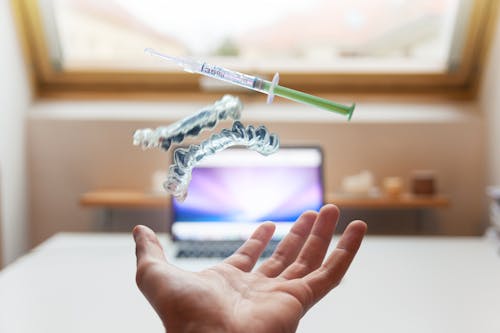
There are two different main types of tests for COVID-19. There’s an antibody test, which tests your antibody levels to help determine your level of immunity towards COVID-19. There’s also the diagnostic (viral) COVID test, such as the PCR test, antigen test and other rapid COVID tests. These help determine whether your current COVID status is positive or negative, revealing whether or not you have the virus.
Antibody tests will test your body’s immune system for antibodies that were produced in response to contracting the virus. When someone gets an antibody test, they’ll need to provide a blood sample. A small sample of blood is typically drawn from a self-administration device, a finger prick, or by a medical professional.
What Are Antibodies and Why Do We Need Them?
Antibodies are naturally occurring proteins in the body that recognize foreign material, and coordinate with the body’s immune system to trigger a defense. Testing your antibody levels is a screening test used as a safety precaution, to determine how well your body responds to an infection. Antibodies can prevent a virus from infecting cells in the body, so one’s antibody levels do correlate to how likely they are to get sick from COVID. Antibodies help the body fight off the virus faster, and high antibody levels help protect people from illness or experiencing severe symptoms.

The Antibody Test is Not for the Purpose of Diagnosing Your COVID Status
Antibody tests aren’t recommended for diagnosing active COVID-19 infections. This is because antibodies could take 1-3 weeks to develop after contracting the infection. That’s why antibody tests are not what are used to determine if a traveler is allowed to cross a border. Depending on where you’re going, if you’re traveling, you’ll typically need a RT-PCR test to confirm your negative COVID status.
Diagnostic tests such as a RT-PCR test or antigen test are used to confirm if someone has a COVID-19 infection. While an antibody test requires a blood sample, the samples for diagnostic tests are typically obtained with a nasal or throat swab.
Many people get both diagnostic tests and antibody tests as an extra safety precaution. Those with weaker immune systems may be slower to produce antibodies and may not produce adequate levels of antibodies. This makes them at higher risk of getting sick from COVID. That’s why it is important to know your antibody levels, merely getting vaccinated is not enough. Circle Snapshot COVID-19 Antibody Test allows you to conduct the test at home comfortably and receive the results on your mobile easily.
Positive results of an antibody test (i.e., when your results are above a certain reference range or level indicated) are not meant to be used for diagnosing COVID.
What Can an Antibody Test Tell You about Your Immunity towards COVID-19?
The COVID-19 antibody test is not recommended for determining your immunity to the virus. If you had a positive antibody test for SARS-CoV-2 infection, it does not guarantee that you are fully immune to the virus, as there is a chance that you may still get infected from future exposure to the virus. A positive antibody test also does not reveal or indicate whether you can transmit SARS-CoV-2 to others. To make an informed decision regarding the appropriateness of antibody testing for you, consult your healthcare provider.
The antibody test is used to determine the strength of a person’s immune response to viral infection or to show the body’s efforts (past infection) or preparedness (past infection or vaccination) to fight off a specific virus. In addition, it is used to assess a person’s need for a booster vaccine. The antibody test is also used to determine how much a previously administered COVID-19vaccine may have protected you against the virus, or if you have been affected previously by COVID-19 infection.
Antibodies decrease or wane over time. That means after a certain amount of time, your body’s immune system will become less capable of producing effective antibodies in time. When that happens, you may be at risk of developing more severe illnesses. The threshold of antibodies for protection against COVID-19 and the time it takes for antibodies to wane vary among individuals. The virus’ memory may reside in long-lived immune system cells that protect patients from severe illness if they are re-infected.

How is the Antibody Test Conducted?
When testing your antibody levels, remember that you need to provide a blood sample. The clinician will use a needle to draw blood. Your blood sample is then sent to a lab where technicians are trained to look for specific antibodies to SARS-CoV-2, which is the virus that causes COVID-19:
- IgM antibodies, which appear early in an infection.
- IgG antibodies, which appear later on.
An antibody test tells if you have antibodies to the SARS-CoV-2 virus. You may have developed these antibodies in response to a previously unknown infection by the SARS-CoV-2 virus, or you developed antibodies in response to your COVID vaccine. The IgG antibodies specifically bind to the spike proteins of the virus and infected cells. This marks the virus and infected cells to be destroyed by your immune system, and blocks them from infecting other healthy cells. This generates a strong neutralizing response in stopping further invasion in your body, and reduces the odds of spreading the virus to others.
Getting an antibody test is just one of the many safety precautions you can take during this pandemic, in addition to getting diagnostic COVID testing, social distancing, wearing the right type of protective mask, washing your hands frequently and with the proper technique, and avoiding anyone who has been tested positive for COVID or is showing symptoms.
References:
- Antibodies and COVID-19 (CDC) – https://www.cdc.gov/coronavirus/2019-ncov/your-health/about-covid-19/antibodies.html. Accessed 25 February 2022.
- “Antibodies and COVID-19.” CDC, 10 November 2021, https://www.cdc.gov/coronavirus/2019-ncov/your-health/about-covid-19/antibodies.html. Accessed 25 February 2022.
- Interim Guidelines for COVID-19 Antibody Testing (CDC) – https://www.cdc.gov/coronavirus/2019-ncov/lab/resources/antibody-tests-guidelines.html. Accessed 25 February 2022.
- Interim Guidelines for COVID-19 Antibody Testing (CDC) – https://www.cdc.gov/coronavirus/2019-ncov/lab/resources/antibody-tests-guidelines.html. Accessed 25 February 2022.
- Interim Guidelines for COVID-19 Antibody Testing (CDC) – https://www.cdc.gov/coronavirus/2019-ncov/lab/resources/antibody-tests-guidelines.html. Accessed 25 February 2022.
- “Using Antibody Tests for COVID-19.” CDC, February 24 2022, https://www.cdc.gov/coronavirus/2019-ncov/lab/resources/antibody-tests.html. Accessed 25 February 2022.






